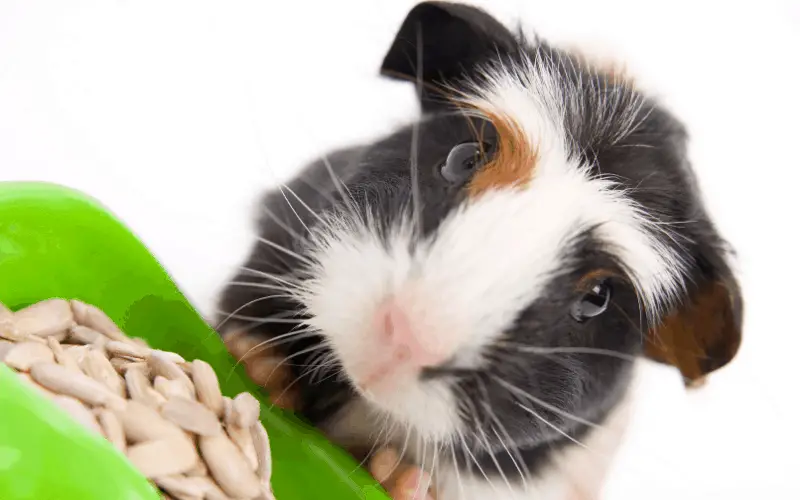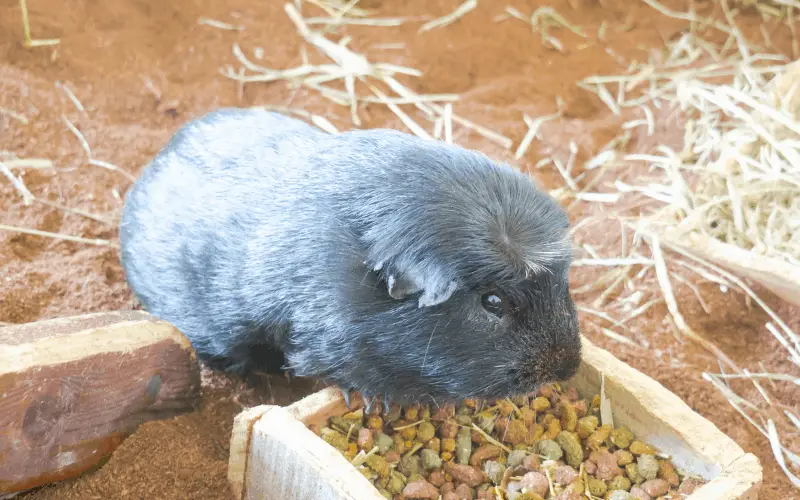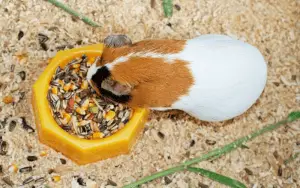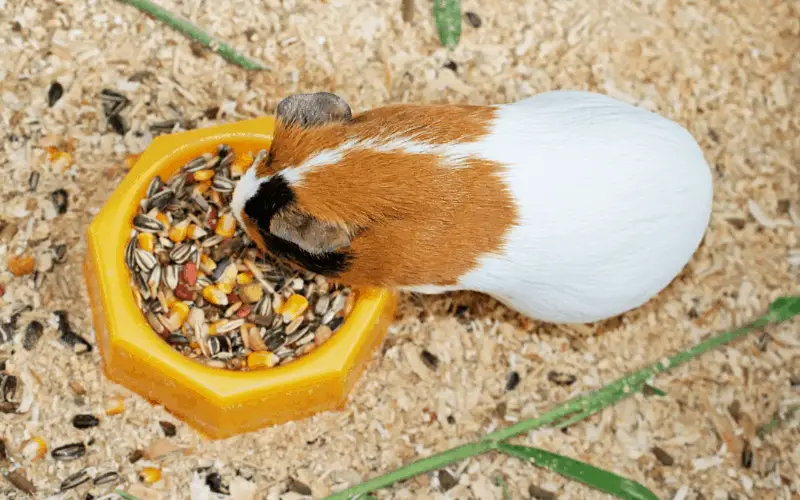The fact that you love your guinea pig a lot doesn’t mean you should feed it straight from the dinner table because some food items that are edible to humans can be toxic to guinea pigs.
There are different types of foods that shouldn’t be fed to your guinea pig for various reasons.
Some foods can have very high sugar or fat content, some might be toxic or are a choking hazard, some may have no nutritional value, while some can cause gas or bloating.
The bottom line is that you need to be careful with what you feed your piggies. But what can guinea pigs not eat? Well, foods like marple leaves, cauliflower, cabbage, garlic, canned corns, etc. are not good for guinea pigs.
In this post, we’ll be sharing with you the various foods you should never give your cavies.
Let’s get started!
What Can Guinea Pigs Not Eat?

Although the main diet item for guinea pigs is vegetables, not all vegetables can be fed to a guinea pig. There are a few which are poisonous and some that cause gas and bloating.
Here are some of the vegetables:
- Cabbage is very gassy, and although it won’t severely harm your guinea pig, don’t feed it to him.
- Iceberg lettuce has no nutritional value and also quite fibrous and watery; although feeding your guinea pig a little piece would kill him, but it can cause severe diarrhea to your guinea pig, so please avoid it.
- Potato skins are very toxic to guinea pigs, especially when the peelings had begun turning green.
- Cauliflower won’t kill your guinea pig but would cause it gas and bloating.
- Any kind of meat because guinea pig’s digestive system can only digest plants but not meat, and it can make your pig very sick.
- Beans like pinto beans, split peas, raw hard kidney beans cause gas in guinea pigs.
- Nuts and seeds like sunflower seeds or ‘birdseed’ type mixes, pumpkin seeds, peanuts are high in fat, so they can cause obesity in your guinea pig.
- Avocado is also very high in fat and can cause obesity.
- Onions, leeks, chives, or shallots can cause blood disorders.
- Diary including cheese, sour cream, kefir, and yogurt are very harmful to your guinea pig because its GI tract does not have the enzyme to break down dairy.
- Garlic is another food item that is very poisonous to guinea pigs.
- Any food item that might have been sprayed with pesticides is very toxic to guinea pigs because they are very sensitive to the chemical residue. In fact, it can destroy their livers and kidneys very quickly.
- Rhubarb or plants high in oxalic acid can urinary and kidney stones, so they should be avoided at all costs.
- Chocolate or candy is very harmful to guinea pigs.
- Seeds and pips are not only high in fats, but some also contain arsenic like apple seeds, and some can be a choking hazard.
- Plastic items that can be nibbled and chewed will lead to your guinea pig swallowing plastic bits that are indigestible and are very sharp.
- Alcohol
- Cat or dog food or any other non-guinea pig food
- Peppers
- Ice cream or fried foods
- Any item with glues, varnishes, paints, or dyes that are not human food-grade safe, like toilet paper and paper towel rolls, are made with industrial glue that is not meant to be eaten.
- Bread
- Peanut butter
- Mushrooms
Read Also: Can Guinea Pigs Eat Canned Corn?
What Foods Kill Guinea Pigs?

- Avocadoes
- Cabbage
- Dried beans, corn, and peas
- Garlic
- Iceberg lettuce
- Chocolate
- Citrus Fruit
- Onions
- Potatoes
- Radishes
- Rhubarb
- Sweet peas
- Biscuits and crackers
- Potato chips
- Pickled foods
- Sugary foods
- Daffodils
- Foxglove
- Grains
- Nuts
What Can Guinea Pigs Eat?
Grass Hay
This is the most important part of a guinea pig’s diet. Hay is a good source of fiber, and guinea uses them to wear down their teeth. It must be available at all times. Hay is a low-calorie food that is very filling, so your guinea pig doesn’t overfeed on fruit and veggies.
There are different sources of grass hay, with timothy hay being the most common. There is also botanical hay, oat hay, orchard grass hay, and alfalfa hay, which only be fed to guinea pigs six months and under due to their high calculation content.
Another type of hay in this category is clover; both hays are actually considered to be legumes that are high in calcium, fat, and sugar.
When purchasing hay, you need to make sure that the hay is fresh, high-quality, dry, sweet-smelling, and mold-free.
Pellets
Pellets consist mostly of hay but also contains vitamins and minerals that grass hays simply do not contain. This includes vitamin A, B-12, C, D, and E and minerals such as Phosphorous, Niacin, Biotin, and Selenium, that all come together to help your guinea pig grow.
When choosing a pelleted food, make sure it is veterinarian-tested and approved and also follow the feeding instructions.
Pellets are composed of plants, seeds, and dried vegetables and should be fed to your guinea pig in monitored portions to avoid your pig from becoming obese; you should serve your guinea pig, nothing more than 1/4 cup of pellets a day.
Pellets that contain seeds or other unnecessary additives like sweeteners, preservatives, or colors should be avoided at all costs.
There are also alfalfa pellets, and as stated earlier, they are high in calcium and should only be fed to guinea pigs six months and younger.
Fruits And Vegetables
Try to feed your guinea pigs 1 cup of fresh vegetables every day and 1-2 tablespoons of fruit for every 907 grams of body weight, not more than twice a week.
When introducing new items to your pig, you want to do it one at a time, and you should always opt for organically grown greens. Greens offer beneficial vitamins and minerals for your guinea pig’s overall health.
Here are some of the healthy vegetables you can feed your guinea pig;
- Brussel Sprouts
- Carrots
- Cucumbers
- Endive
- Green capsicum
- Romaine lettuce
- Carrots and carrot tops
- Peas
- Broccoli spears
- Spinach
- Artichokes
- Kale
- Tomatoes without the stems or leaves
- The types of fruit that are safe to feed your guinea pig include;
- Apples
- Blueberries
- Melon
- Oranges and their appealing peels, too.
- Papaya
- Pear
- Peach
- Pineapple
- Plum
- Raspberries and Strawberries
Water
Water is essential to a guinea pig’s health, and They drink a LOT of water. So you need to make sure that water is readily available for your pig because its diet usually consists of staples, pellets, and grains that are mostly dry.
Vitamin C
Like humans, a guinea pig cannot produce their own vitamin c, so it has to be supplied by their diet or supplements. You can provide your guinea pig with vitamin c either through a liquid vitamin c that is fed with a syringe or chewable tablets.
Fresh fruits and vegetables are also a source of vitamin c, but you want to feed them this in small portions due to their high sugar content.
Treats & chews
It’s recommended that treats, including fruit that you feed your guinea pig, do not exceed 10 percent of its total food intake.
Also, when purchasing treats, you need to be mindful of its ingredients because Some commercially produced treats only contain artificial sweeteners, sugar, or salt with no nutritional value.
Giving your guinea pig fun chew toys like sticks, toys, balls, blocks, and treats made especially for small animals will help to groom its teeth as well as help your guinea pig to relieve boredom, especially if you have just one piggy.
A small animal salt lick is another source of a treat for your guinea pig, and it is a rich source of healthy minerals. It is a healthy way to satisfy your guinea pig’s desire for salt.
Cecotropes
Guinea pigs have an unusual method for supplementing their unique nutritional needs given to them by nature. Cecotropes happen to be one of them; they are small, soft pellets that contain nutrients that have been absorbed from plant matter during the digestive process.
They pass from the guinea pig’s large intestine, out from the anus, and are consumed immediately. Do not try to discourage your piggy from doing this because it looks revolting, because cecotropes are a necessary part of your guinea pig’s diet.
Read Also: Is Oak Leaves Good for Guinea Pigs?
Conclusion
Feeding your guinea the right food item is very crucial and has a direct impact on the pig’s overall health. This article will give you a list of what can guinea pigs not eat and what they can eat. This way, you are able to feed and take care of your pet correctly.
Small Pet Select 2nd Cutting Perfect Blend Timothy Hay Pet Food

Small Pet Select 2nd Cut Timothy Hay is a perfect balance of stem, seed-head, and leaf to provide the rough fiber needed for normal wear to healthy teeth and yummy features with a fresh smell to keep them coming back for more.
Product SKU: B07CJ2FRNC
Product Brand: Small Pet Select 2nd Cutting Perfect Blend
4.4
Pros
- Good value for the price
- Fresh, green and fragrantly rich scent
Cons
- Inconsistent that some have poor quality hay
Kaytee Timothy Complete Pet Guinea Pig Food

Kaytee Timothy Complete Guinea Pig food was developed by an animal nutrition expert to ensure your small pet gets the proper nutrition for a long, healthy life. Timothy Complete is high in fiber to support digestive health and contains long-lasting vitamin C.
Product SKU: B0002DGIGK
Product Brand: Kaytee Timothy Complete
4.8
Pros
- Recommended by mostly veterinarians
- Very Affordable at reasonable price
Cons
- Poor packaging/easily ripped bag
